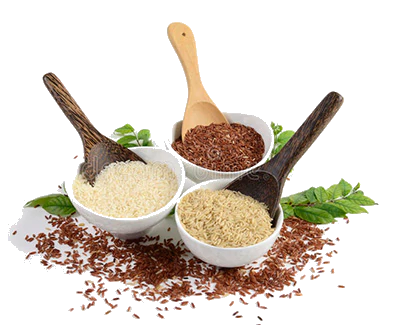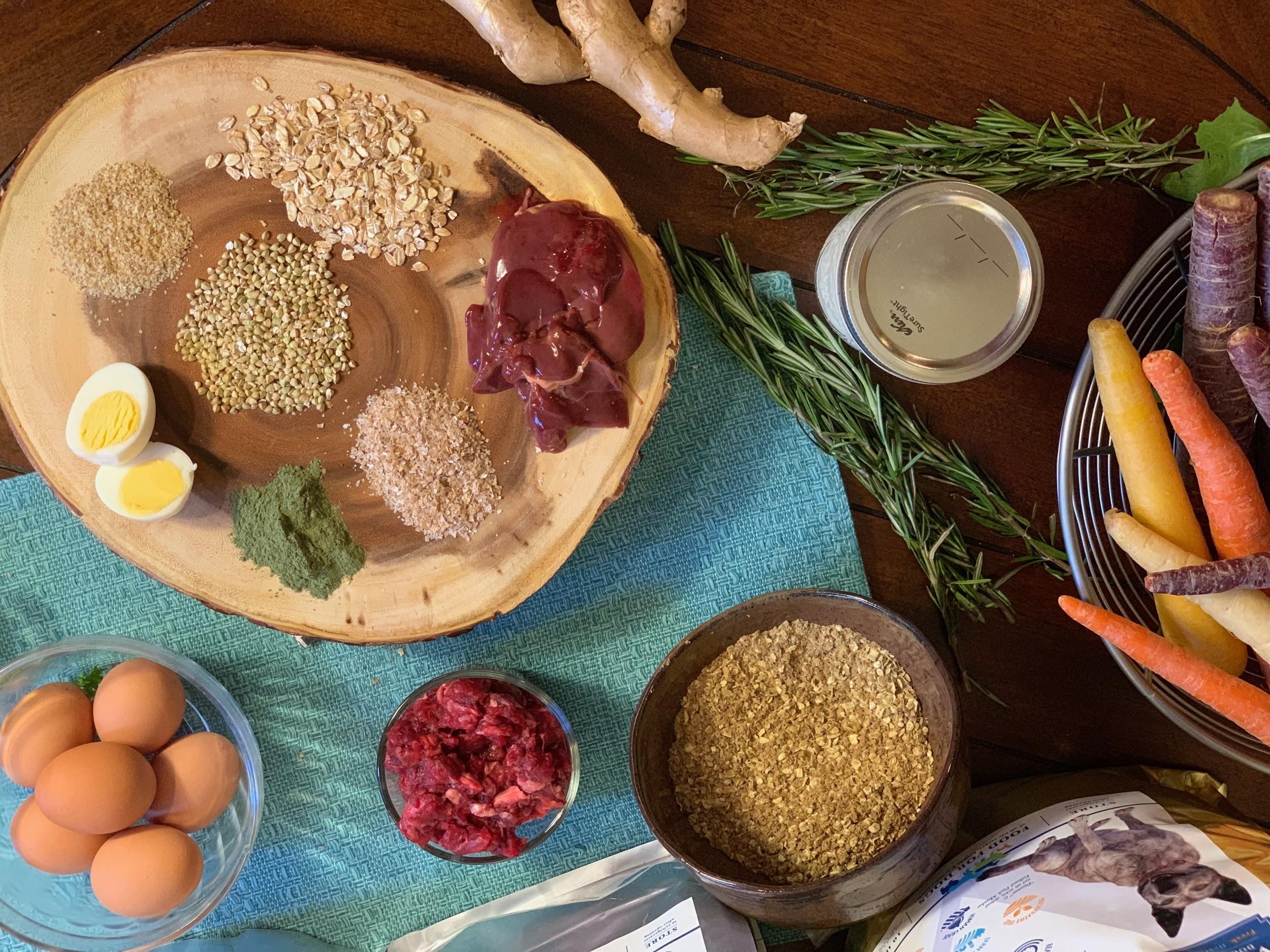Canine Digestion and Carbohydrates - One Big Reason the Volhard Diet Works
Posted by Jennifer Carter on Apr 25th 2019
Picking a dog food is very difficult these days and the debate as to whether or not your dog needs carbohydrates to be healthy is an ongoing one. You should choose a food based on the protein percentage and the fact that it is not over processed and once that is accomplished you can then take a look at the rest of the ingredients and make an informed decision on what is best for your dog. Carbohydrates are not seen as an essential part of your dog’s diet- meaning that they can live without them, however, having the right source and amount of carbohydrates do benefit the dog’s health overall.
I am saying that your dog doesn’t need many carbohydrates to be healthy but does require some grains and
 vegetables for energy, proper
digestion, stool formation and the correct functioning of the thyroid
gland. The Volhard diet contains oats,
wheat germ, and wheat bran, which are purposefully chosen because they are
grains that provide vitamins and minerals in addition to protein and fat in the
diet. They are not fillers!
vegetables for energy, proper
digestion, stool formation and the correct functioning of the thyroid
gland. The Volhard diet contains oats,
wheat germ, and wheat bran, which are purposefully chosen because they are
grains that provide vitamins and minerals in addition to protein and fat in the
diet. They are not fillers!
NDF products use less than 25% of grains in their total makeup. Flaked oats (almost gluten free) are 75% of the cereal used in NDF and 25% comes from buckwheat groats (a non-grain seed, which is gluten free), a combination of which seems to agree with most dogs. Carbohydrates are the main source of blood glucose that fuels all the body's cells and the only source of energy for the brain and red blood cells.
Thyroid function is also dependent upon the correct amount of carbohydrates in your dog's diet. Vitamin B complex, found in some grains and starch producing vegetables is needed so that the amino acids (protein) phenyalanine and tyrosine can produce T3.
Here are the carbohydrate ingredients and why they are chosen:
 Oats - A warming grain that calms the nervous and reproductive
systems, strengthens the spleen, pancreas and immune system, as well as the
heart muscle. Rich in silicon, oats help make bones strong. Acidic and not very
allergenic, they are tolerated best by the largest number of dogs.
Oats - A warming grain that calms the nervous and reproductive
systems, strengthens the spleen, pancreas and immune system, as well as the
heart muscle. Rich in silicon, oats help make bones strong. Acidic and not very
allergenic, they are tolerated best by the largest number of dogs.
Buckwheat - An alkaline seed with a sweet flavor. It cleanses the intestines and improves appetite. Buckwheat contains rutin, a bioflavonoid, which helps to strengthen capillaries and blood vessels and inhibits hemorrhaging. It, too, is tolerated well by the majority of dogs.
Wheat Germ - Source of Vitamin E, most of the B-complex vitamins. Contains calcium/phosphorus/magnesium, as well as trace minerals.
Wheat Bran - Helps to regulate cholesterol, removes toxins from the body as it cleanses the large intestine. Absorbs up to 10 times its own weight in water that helps to prevent diarrhea. Produces a well-formed stool.
The Volhard Natural Diet is a dehydrated diet that is minimally processed allowing the vegetables, herbs, and grains to remain raw. This offers good digestibility while also leaves the enzymes and bacteria living so that they can be utilized by the dog’s microbiome.
NDF2 has 15.8% carbs when the largest ingredient of protein (80/20 beef) is added and fed as a complete and balanced diet. The original AM/PM diet has 23% carbs (higher because fresh veggies are used in the AM meal versus dehydrated) when protein is added and nutritional analysis is conducted after both foundation mixes are fed in a day. The choice to use keto friendly vegetables or fermented vegetables brings down the overall carbohydrates in the diet.
Carbohydrates need to be broken down in order to be digested. Dry dog food companies use heat to accomplish this and inherent to that process is the death of all vitamins, minerals, living enzymes and bacteria. The first question that may come to mind when comparing my thoughts about carbs to the diet of the ancestral wolf or feral dog might be where do they get grains and vegetables in their diet? The answer is in the intestines of the prey that they eat. The bacteria and enzymes that the prey use to digest these nutrients begin the breakdown of the carbohydrates and when the dog eats that prey they get a nicely predigested meal that is bioavailable.
Dogs, different from humans, in the fact that they lack salivary amylase and because of this enzymatic digestion of carbohydrate begins in the dog’s small intestine.[1] Glucose, galactose and fructose, whether initially consumed as monosaccharides, disaccharides or part of a polysaccharide, are readily absorbed across the small intestinal mucosa and enter circulation after the consumption of food. Absorbed glucose directly contributes to circulating blood glucose concentrations, while galactose and fructose are first metabolized by hepatic fructokinase. Glucose is important to energy for the dog and it crosses the blood/brain barrier which few nutrients do.
A number of factors impact carbohydrate digestion for dogs. These include age-related changes in enzyme activities as well as inherent species differences in metabolic pathways. Lactase activity is highest in puppies and decreases with age. In contrast, pancreatic amylase activity increases with age. Overall carbohydrate digestibility decreases with age in otherwise healthy dogs. We recommend no matter what you are feeding to include Volhard’s Digestive Enzymes to assist the dog with the breakdown of nutrients while also providing the gut prebiotics and probiotics. The AM/PM diet is very unique as it separates the carbohydrate part of the meal from the protein. This allows a senior dog or a dog with digestive issues, recovering from illness or injury to have a simplified digestion process where enzymes can be efficient- allowing a smooth digestion of like nutrients.
In dogs, starch digestibility is also affected by the source and type of carbohydrate present as well as the degree of processing of the carbohydrate.[2] Volhard dehydrated diets are guaranteed to use NON-GMO grains and no ingredients in this food come from China! This

sourcing is pivotal in providing a diet that is fresh, healthy and balanced while also species appropriate and convenient for the pet owner.
The type and amount of non-absorbable carbohydrate (i.e. fiber) presented in the diet will also influence the post-prandial glycaemic response in dogs. Postprandial glycaemic response refers to an elevated blood glucose concentration after a meal. Foods yielding low postprandial glycaemic responses have been suggested to be beneficial for the dietary prevention of type 2 diabetes. The presence of highly soluble, fermentable fiber content in the diet will slow carbohydrate digestion and absorption resulting in dampened post-prandial blood glucose in both healthy and diabetic animals. Ground, cooked and extruded starches are almost 100% digestible in dogs, while digestibility of raw (uncooked) starches varies from 0-65% depending on the type of starch. Resistant starches are formed when solubilized dietary starch recrystallizes upon cooling forming a structure that is resistant to pancreatic amylase.
Bacteria exist in the stomach, small intestine and colon and starches and sugars are prebiotics for healthy bacteria to flourish creating a diverse microbiome. Without a diverse microbiome 70% of the dog’s immune system can be compromised creating inappropriate inflammatory responses that are observable in food sensitivities, digestive issues, itching, scratching, yeasts and ear issues as a few examples. The presence of healthy bacteria keeps pathogens at bay. The presence of bacteria along with amylase helps a dog appropriate carbohydrates into the body. If the bacteria levels are unbalanced then the dog only has enzymes and organs to process this nutrient and problems can be observed.
Fiber, as previously mentioned, does, however, benefit a dog's body by keeping the digestive processes in working order in two ways: Soluble/fermentable fiber, found in many whole grains, is the food for “good” gut bacteria which, in turn, produce free-fatty acids to feed the dog's colon cells and keep his digestive system healthy.
Finally, grain-free diets or diets with the wrong source or amount of high-quality carbohydrates do not provide the dog with the prebiotics needed to feed probiotics which keep the microbiome of the gut diverse, rich and even. If there are no prebiotics available then certain bacterial strains do not exist in the digestive tract which could lead to unbalanced good and bad bacteria in the dog.
[1] Hilton J. (2006) Carbohydrates in the nutrition of dog. Can Vet J 1990;46A:359-369.
[2] Camire ME, et al. (1990) Chemical and nutrition changes in food during extrusion. Food Sci Nutr 1990;29:35-57.


